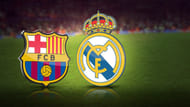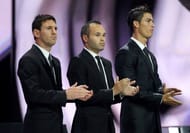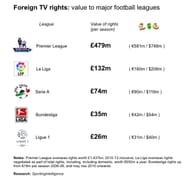“Would Barcelona be able to cope with the physicality of the Premier League? With the long throws and long balls that teams like Stoke and Blackburn would play against them? I don’t think so.”
Back in 2010, during a match between Everton and Manchester City, Andy Gray quoted the above. Not a statement made after a lot of thought but nevertheless, the statement stands for itself. On the face of it, what Gray wishes/ assumes is perhaps the fact that Barcelona’s extensively intricate passing game shall be rendered null by the physical challenges posed by the English sides.
Going into more detail, Gray suggests that the most celebrated club of the last decade will not survive against a team that barely manages to make the top half of the Premier League. This statement comes down as amateur and childish, unworthy of coming out of a well-known football critic.
As we plunder further into this topic, let’s take a look into an impossible idea, but one that shall open up some arguments. How would Real Madrid and Barcelona, the two stalwarts of La Liga (sorry Atletico, one more year and you shall be here) fare in the Premier League? Let’s pose this analysis through different means:
Players
Well, this area is one where Premier League isn’t remotely close to the La Liga. The departure of Luis Suarez recently deprived the Premier League of the one player they had who could claim to match up to Spanish levels.
Eden Hazard, Mesut Ozil, Alexis Sanchez, Robin van Persie Yaya Toure, David Silva and Sergio Aguero are some players who could possibly make this list. Please note that I am definitely not including Wayne Rooney who hasn’t showcased performances that live up to anywhere near the tag of world-class.
Compared to this meager list, Barcelona and Real Madrid are far ahead. Gareth Bale, Cristiano Ronaldo, Andres Iniesta, Leo Messi and so many more. Real Madrid and Barcelona are genuinely filled with stars that the Premier League can hardly think of matching. No one in the Premier League is even close to the likes of Leo Messi, Cristiano Ronaldo and Gareth Bale. Added to that, players such as Ronaldo, Alonso and Gareth Bale have lots of experience in the Premier League. They are some of the players well-versed with the demands of the Premier league. This definitely tilts the balance in favour of Real Madrid and Barcelona.
If we look at it from the perspective of players, Barcelona and Real Madrid are superior and may leave the top Premier League clubs trailing far behind. In such an event, the most likely scenario is that clubs such as Manchester City, Chelsea and Arsenal are fighting for the Champions League spots while the superiority of Spanish clubs reduces the Premier League to a two-horse race.
Manager and Administration – Profound ground work
Josep Guardiola, the man behind Barcelona’s excellent administration of the passing philosophy always laid his stress on one thing, dominating the ball. It was his belief that a team that dominated the ball had a greater chance of winning than the one who trailed on the ball. True to his word, he set up a team which was adept at finding spaces. Guardiola inherited a team he knew well, a philosophy that was well-established and a player who showed bouts of brilliance never seen before and he effectively worked them together to create the greatest club of the past decade.
Unlike such profound analyses, English clubs often are placed in precarious situations due to the improper administration of the club. A huge example was Jose Mourinho’s sacking in 2007 after disagreements with the board. Roman Abrahamovic had bought Andriy Shevchenko against the wishes of the manager, and he chose to quit. While democracy may prevail around the world, in a football club, one person rules over.
And that’s the manager. He makes the team tick and he must be the one to take decisions. The owner must remain to his duties which shall be nothing more than approving the decisions of the managers and advising them financially. By his own idiocy, not only did he lose an excellent manager, he also lost the confidence Mourinho had built at Chelsea. From a team that dominated Premier League with a bossy 4-3-3, they were down to playing 10 at the back to fend off big teams.
To avoid such unwanted problems and tamper with the harmony of the team, Barcelona follow a policy where the manager is Numero Uno. Real Madrid, known for their costly signings, leaves the running of the team to their manager, which happens to be Ancelloti. He made a tactical masterstroke upon his arrival, which was the usage of a 4-3-3 that effectively transformed into a 4-2-3-1 as and when required. Angel di Maria was the key in that formation and he displayed it at the big stage. The mark of a great manager is to bring out the best from his resources. Although Mourinho is in the Premier League, he was unable to prove his full worth as he ended up without a trophy and could not make it big in Europe.
Premier League’s fallen back principles - A Physical Game
The Premier League’s teams play varied formations. From a 4-4-2 by Manchester City to a 5-3-2 by Liverpool last season, the diversity in tactics is quite established. However, the lack of technically astute players has been quite a blow to their Premier League. As evidenced by La Liga’s domination of Europe, Spain’s unquestioned superiority over England leaves them a pretty easy field. The physical game has never really shied away from the English teams and the one team that go against it, Arsenal perform inconsistently. This shows that English teams always have an amount of physicality which is easily countered by a technical approach.
The Premier League nullifying Barca’s superiority with physical exhibitions is literally impossible on a consistent basis. Barca are so disciplined and technically astute on the field that even a rough and violent game won’t suffice to dismantle them. Barca’s players are predominantly small, and have a low center of gravity making it easy for them to survive in a league of tough men.
Real Madrid, on the other hand, counterattacks very well. They have players who function efficiently in that system and that serve them well. By winning the Champions League last season, they showed us that they could beat any team on the planet. Once again, English players lack of discipline contributes a lot to their downfall. They disintegrate during matches and invite the opposition to exploit them, while Real Madrid perform as a combined unit throughout. There isn’t much of tactical brilliance like Barca, but a proper plan is what Real Madrid have and that works like a charm against any team.
Buy the new Barcelona 2014/15 kit here
Buy the new Real Madrid 2014/15 kit here
Financial advantage
We must dwell upon the first point in this case, that is the fact that Premier League is far more popular than the La Liga. The revamp in 1991 has been done to some good measure that the Premier League is higher up the popularity scale than its counterparts in Europe.
For a cumulative look, according to football-marketing.com’s data in 2011, every La Liga averaged 2.2 million viewers while each Premier League match averaged 12 million viewers. This massive difference makes the Premier League as the template for its European counterparts on a revenue-earning basis. The Premier League supposed audience is a staggering 4.7 billion people from 212 countries. The La Liga has the better players because of their reputation and importance on the football, a quality that has attracted the players rather than the business tycoons. Apart from the El Clasico, the amount of non-Spanish population watching the games is significantly low.
On the contrary, up to teams such as Southampton and Newcastle, the Premier League has a worldwide audience. La Liga’s technical and tactical methods have no effect on this front, and the lack of challenge makes it a boring league. Whereas, games in the Premier League are exciting to watch with a high pace and the use of physicality means there are a lot of heated moments.
Another important point is the commentary, where Spain lags behind. The world around is ready to listen to English and the Premier League commentators are very good, if not excellent. Although Andy Gray’s above statement was a grave blunder, the Premier League commentators make the game as exciting as possible. However, the Spanish commentary for a La Liga match turns down people and the English one is bland.
There is a huge difference in quality of commentary. While it may not seem a big point, commentary is something that attaches people to the match. Spain does not have a coherent structure for selling the TV rights. Every club has to make do individually, which means that apart from Barcelona and Real Madrid, all the clubs have a lesser turnover. Even when you look at that, the collective turnover of the Premier League, which is done wholly, amounts to a $748m that dwarfs the La Liga’s, which is just $206m.
With such huge a difference and two fan-owned clubs being taken in the Premier League, it may take time for them to bode with the financial nous of the Premier League(https://www.sportskeeda.com/football/deal-with-the-devils-manchester-united-and-adidas-glazers-debts/). The amount of advertising and promotion is far higher and their club has a better reach. For a Real Madrid or Barcelona that already comes among the richest clubs in the world, the Premier League only adds to it.
While these may stagger the immediate production of results, once they are familiar, the Premier League would prove a big advantage to them. Their already large budget would be massively increased, not to mention their fan bases. A Leo Messi playing in the Premier League reaches the world over and is a massive crowd-puller.
Conditions and fixtures
The one thing Spanish clubs lack in this situation is familiarity. The English conditions are quite extreme compared to Spain. The winter is very harsh in England. The Spanish clubs mainly contain players from Spain, South America and Central Europe. These regions do not experience the kind of weather than England does.
The Premier League players have been used to the conditions over the past seasons. This definitely gives them an advantage during the 2-month period including post-winter recuperations. Especially, the Premier League has a tight schedule in December while Spain has a break at that time.
This would certainly result in a lot of fatigue. While not only this, there is an additional trophy in England that the clubs have to play for; CapitalOne Cup. This nearly makes it an additional 6 matches for them. Taking in all these factors along with the more lenient refereeing in Premier League, Real Madrid and Barcelona would never have it easy in the Premier league. It would be a great challenge to them to perform initially. Surely, they would need at least two years to get used to the Premier League.
Overall possibilities
Teams in the Premier League do not have the flexibility to adapt to changing situations. Their goals are based on a fixed principle and that is to win a match.
One hardly even concentrates on the multiple stages involved in achieving the result. With Barcelona and Real Madrid, we have two contrasting teams who are the best in their style of play. Seeing their necessity to adapt, their results will take time.
However, we can be sure of one thing, once they do get used, they will prosper. While they may make up a Champions League finish in the first two seasons, from the third, they shall be direct contenders for the title and most likely, one shall go away with the crown leaving the others mixed up in the bag.




